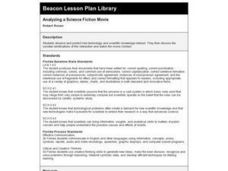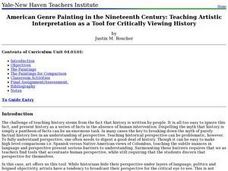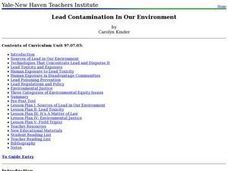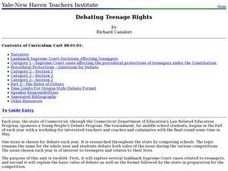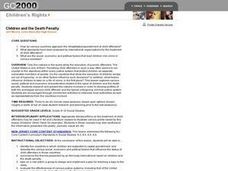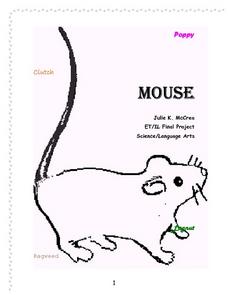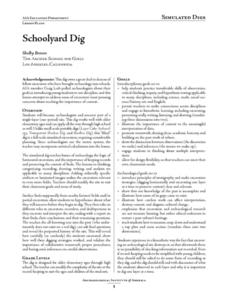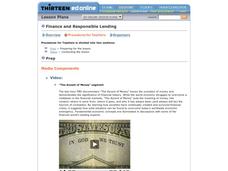Curated OER
Augustus: First of the Roman Emperors
Students explore how Julius Caesar's military brilliance forged a new Rome, but Augustus' political genius made it an empire for the ages. Despite being Caesar's nephew and adopted heir, Augustus struggled for thirteen years to...
Curated OER
Analyzing a Science Fiction Movie
Fourth graders watch the movie "Contact" and write a review. They discuss in their review how scientists deal with technological problems, the movie's connections to the nature of science and how technology affects science. They share...
Curated OER
American Genre Painting in the Nineteenth Century: Teaching Artistic Interpretation as a Tool for Critically Viewing History
Students view a variety of artwork to determine the history and lifestyle of people from New Haven, Connecticut. In groups, they develop their individual hypothesis about why the paintings were created and share them with their group...
Curated OER
Lead Contamination In Our Environment
Students identify the sources of lead in their local community and how to prevent further contamination. As a class, they watch a video about the effects of lead on the body and use the internet to discover any new technology that can...
Curated OER
Perpetual Motion
Young scholars are introduced to the concept of Energy Conservation with the example of: Tony Hawk seems to defy the conservation of energy as he keeps reaching new heights on each pass on the halk-pipe. Actually, Tony is supplying the...
Curated OER
Web Puts Undiscovered Musicians, Listeners In Tune
Students read an article from USA Today about technology and the music business. In this news article lesson, students read an article about failed musicians and their new roles in music and technology. Students discuss the article and...
Curated OER
Inspiration for and Application of the Bill of Rights
Students examine individual rights. In this case law lesson, students discuss the from and function of the Bill of Rights prior to investigating several cases that deal with Constitutional rights. Students discuss the outcome of the...
Curated OER
Pocahontas
Students, after studying about Pocahontas, identify ways they can deal fairly with others. Given various scenarios, students demonstrate proper social skills. They describe their contributions of peace to their family, school and community.
Curated OER
Their Eyes are Watching
Fourth graders create a character map for each character in the novel, adding to each as he or she is revealed in "Their Eyes Were Watching God." They document how each character deals with attitudes and injustices.
Curated OER
Once in a Blue Moon
Third graders identify the phases of the moon. They use technology to access websites on the Internet dealing with the moon.
Curated OER
ESL: Using the Telephone
Twelfth graders practice telephone etiquette skills by simulating phone conversations. They discover how to making simulated 911 calls, taking phone messages, and dealing with telemarketers.
Curated OER
Prisoners in Another War
Students identify violations of the Geneva Convention in video clips. They discover the role of international bodies in dealing with war crimes. They read primary source documents as well.
Curated OER
The Periodic Table of Elements Game
Students participate in a game dealing with elements on the Periodic Table. They work together to develop their answers. They answer other discussion questions to complete the lesson.
Curated OER
Production Methods
High schoolers examine the different methods of production. They relate the new concepts to different production contexts. They identify the external factors that influence firms.
Curated OER
Debating Teenage Rights
Students deal with 'real world' questions in settings that resemble Congress or the courtroom. They identify a problem, find causes, research possible solutions, determine the best solution, and plan a means of implementing the best...
Curated OER
The Risk-Benefit Factor Challenging Our Environment
Seventh graders examine the factors that are contributing to the degrading of the Earth's environment. In groups, they analyze the types of hazards when dealing with pests and give an example of each. For each situation given, they...
Curated OER
What Can We Do About Trash in Our Community?
Fourth graders examine how to deal with the amount of trash in their community. They discover alternate ways of managing waste. They develop their own solutions to the problem.
Curated OER
Children and the Death Penalty
Students examine how different countries deal with juvenile offenders. Using the internet, they research what offenses are punishable by death and how the laws protect students. They interview local authorities and discuss possible...
Curated OER
Mouse
First graders are exposed to a variety of texts that deal with mice. The use of the library is recommended to saturate the classroom with available books. Young students work in groups with the help of the teacher to define traits and...
Curated OER
Intergenerational Friendships
Students complete a variety of activities dealing with the book "Wilfrid Gordon McDonald Partridge" by Mem Fox. They take a field trip to a senior citizen's home and conduct an interview, and complete journal entries having to do with...
Curated OER
Subtracting Fractions
Students investigate the concept of subtracting fractions. They use a variety of problems in order to practice new skills. The independent practice is used to obtain an informal measurement of mastery with the use of a formal quiz for a...
Curated OER
Schoolyard Dig
Learners begin the lesson plan by being introduced to the new vocabulary associated with archaeology. In groups, they use the school grounds to simulate their dig site. They record all the objects they discover and what can be gathered...
Curated OER
Assistive Technology
Students engage in a instructional activity that is concerned with the use of technology in order to help students with special needs. They take part in a instructional activity that is designed to help a specific student with an...
Curated OER
Finance and Responsible Lending
High schoolers learn the characteristics of economic systems through problem solving, communication and representation. In this financial lending lesson, students use math to solve problems dealing with the economy today, to work with...



